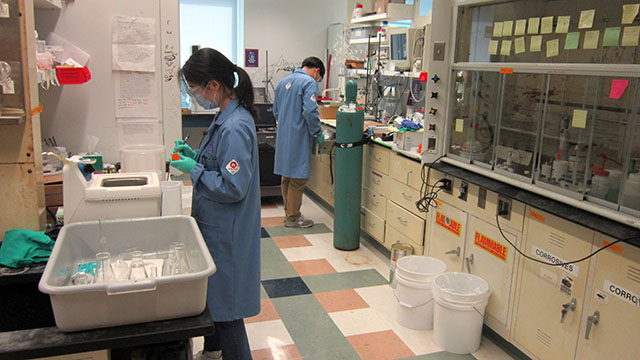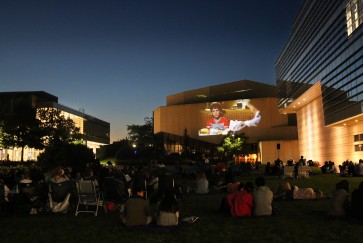Northwestern’s Phased Return to Campus moves to Step 3 this week with additional faculty and staff, as well as some students, repopulating the Evanston and Chicago campuses.
Research, athletics, libraries and arts are among the programs reestablishing a physical presence on campus.
As the COVID-19 pandemic evolves, all University community members are required to complete training before returning to work. A set of Core Responsibilities — including social distancing, face coverings, proper hygiene and health monitoring — will guide schools and units in developing and executing plans this summer tailored to their specific needs.
“There is still much uncertainty regarding how our campuses will need to adapt in the months ahead. What we do know, however, is that the health and well-being of our community requires us to work together to protect one another,” read a May 22 campus message from Northwestern leaders.
This spring, the University began its Phased Return to Campus plan at Step 1, which meant essential staff only on campus, classes delivered remotely, essential and COVID-19 research only on site and no travel, events or visitors. It transitioned to Step 2 at the beginning of June after Governor J.B. Pritzker lifted the Illinois stay-at-home order and Mayor Lori Lightfoot followed by reopening facilities, parks and some non-essential businesses in Chicago.
The six-step phased return plan, which culminates in the beginning of the new academic year in September, is detailed on the University site COVID-19 and Campus Updates.
Research
Northwestern research operated primarily on a remote basis during the stay-at-home period. The Office for Research, led by Vice President Milan Mrksich, remained highly productive in its broad administrative functions and helped boost essential, high-impact work on the front lines to fight COVID-19. Many projects have received RAPID grants from the National Science Foundation and, in fact, sponsored research funding is ahead of the pace set in fiscal year 2019 when Northwestern took in a record $797.8 million.
At the same time, Mrksich and his extended team, which includes the Office for Research Safety, have been collaborating with campus partners and health experts to pave the way for a safe and gradual reactivation of many more programs across the vast enterprise. The work initially focused on bringing back more laboratory-based research in disciplines such as chemistry, bioscience and physics, among others. Now efforts are underway to do the same for research involving non-clinical human participants in other research spaces on campus. Guidance from the Institutional Review Board Office is playing an important part in supporting this transition.
New guidelines for all investigators require the submission of a research plan for on-campus work during the pandemic. The plans must address how researchers and their teams intend to effectively follow University guidance to practice social distancing and wear face coverings, clean and disinfect, and track activity in the research space. Investigators also must complete the mandatory “Pandemic Essentials: Research on Campus” online course developed by the research office and assigned through myHR.
A key goal is to reduce the typical density of research facilities, which means a fraction of the people will occupy labs and research spaces at any one time — up to 50% for now, with additional occupancy increases to occur over the summer as circumstances warrant. Controlling density will be achieved through staggered work shifts and strict adherence to the policy that only lab work should be done in the lab. Grant writing, theory development and experiment planning, for example, all must be done from home.
“We will continue to monitor work in our laboratories and are likely to revise or implement additional guidance due to changes in government orders and the needs of our research community,” Mrksich wrote in a May 28 message to the research community. “Of course, our decisions will continue to be informed by the latest recommendations from state and federal public health authorities, as well as by our own medical experts at Northwestern.”
Mrksich indicated this week that his office will soon be releasing updated guidance for July to reflect considerations associated with Phase 4 of the state’s “Restore Illinois” plan, expected to begin June 26.
Athletics
Northwestern Athletics makes its return to campus this week with voluntary workouts by a limited number of teams, including football and men’s and women’s basketball. Several sports medicine and training staff and student-athletes with post-surgical and post-injury rehabilitation returned earlier in June.
All student-athletes receive a full physical upon arrival in Evanston, including COVID-19 testing. There will be recurring health screenings and wellness checks executed daily throughout the summer.
Art Theory and Practice
Several graduate students in the Weinberg College of Arts and Sciences are returning to finish thesis projects for the Master of Fine Arts (MFA) degree.
Like all research that requires lab infrastructure, many art projects stalled during the stay-at-home period. They necessitate, for example, video and sound editing equipment, woodworking machinery or sophisticated ventilation systems due to the use of paints and solvents.
MFA students can reserve time on a shared calendar to ensure proper distancing in studios, workshops and labs at Locy Hall and Kresge Hall.
The culmination of the two-year MFA is a public exhibition, which the department hopes will be held later this summer or in early September.
Libraries
Faculty, staff and students will be able to request books from the circulating collections via the NUsearch online library catalog and arrange for a pick-up of requested materials at a designated time.
Libraries are adding an extra layer of security for all electronic resources, including journals and databases. Beginning July 1, users accessing electronic resources will sign-on as usual using Online Passport and then be prompted to use Multi-factor Authentication. This includes Northwestern University Libraries, the Pritzker Legal Research Center, Galter Health Sciences Library & Learning Center, Qatar Library, and the Styberg Library.
Details about current library services can be found at the Updates to Library Services page.


